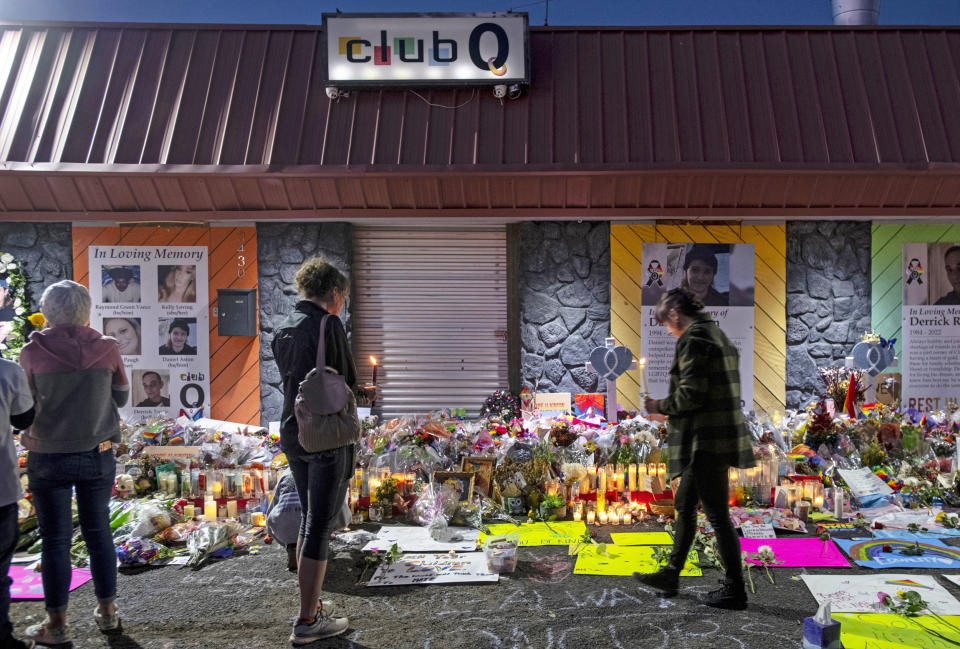Suspect in Colorado LGBTQ nightclub massacre is charged with 305 counts, including murder and hate crimes
The suspect in last month's deadly rampage at a Colorado LGBTQ nightclub was charged Tuesday with 305 criminal counts in what could be the most heavily prosecuted murder case in state history, authorities said.
The charges filed against Anderson Lee Aldrich include first-degree murder, attempted first-degree murder, first- and second-degree assault and bias-motivated crimes, District Attorney Michael Allen told the court.
Aldrich is suspected of killing five people and wounding 17 others on Nov. 19 at Club Q in Colorado Springs. Five more were injured but not by gunshots. Twelve others were victims with no visible injuries, police said.
Allen said he couldn't recall a murder trial with so many counts.
“At least to my knowledge, I think it’s probably the most charges that we’ve ever filed in a single case, on a murder case like this in the state of Colorado," Allen told reporters after the hearing. "But there could be others out there that I’m just not thinking of right now.”
The homicide charges include two variations, murder in the first degree and murder by "extreme indifference," and both carry the possibility of life in prison without the possibility of parole.
While first-degree murder is typically associated with an intended victim and motive, Colorado's extreme indifference statute is meant for defendants who aimed to kill someone —but just not a targeted individual, University of Colorado clinical law professor Ann England said.
"It comes down to changing the (victim's) name 'Bob Smith' to a (random) person," England said. "It makes sense that it's equal (in punishment) because, really, is it less morally culpable to kill just a person I don't know versus a person I intend to kill, you."
The extreme indifference charge against Aldrich might be the more appropriate allegation "based on what we know," according to the professor.
"But I feel we don't know (all the facts) yet," she added. "And I feel like there could be a mixture in there. Maybe there was somebody the person (Aldrich) had trouble with (inside the club that night) and it just turned into this bigger thing (with other victims)."
Lawyers on both sides asked the judge to schedule Aldrich's preliminary hearing for May.

“We have a lot of obligations already, both of us, that make it very difficulty to get something scheduled in the early spring," defense lawyer Joseph Archambault told the court.
Allen cited his own busy trial schedule and said defense lawyers will need time to go over all of the evidence against their client.
Allen, on March 17, is set to start the high-profile murder trial of Letecia Stauch who is accused of killing 11-year-old stepson Gannon Stauch, who vanished in January of 2020.
“This case we expect to be very voluminous (and) will probably take some time for defense (lawyers) to digest it and be ready for presentation of evidence at a preliminary hearing,” Allen told the court.
But 4th Judicial District Judge Michael McHenry insisted the hearing can start sooner and ordered both sides to be ready on Feb. 22 for a preliminary hearing he expected to last two days.
“I would be surprised if we get to an actual jury trial sometime in 2023," Allen later told reporters. "I suspect it’ll be sometime later than that.”
Judge McHenry also ordered, over defense objections, release of the arrest warrant affidavit used to support Aldrich's apprehension. The court record will be made public before the close of business on Wednesday, the judge ruled.
Aldrich sat alongside defense lawyers, wearing a fluorescent lime jail uniform and appearing attentive throughout the proceeding.
Tuesday's pre-trial hearing was the first time the public saw Aldrich since Nov. 23 when the 22-year-old made an initial court appearance.
The suspect, who was roughed up by club patrons who desperately fought back during the shooting, appeared lethargic that day and struggled to sit upright in a wheelchair.
Booking mug shots showed numerous cuts all over the suspect's face, a black, swollen left eye and a bruise behind the left ear. Aldrich is nonbinary and uses they/them pronouns.
“At the very first setting, the suspect’s demeanor and body were much different than today," Allen said after the hearing.
The suspect "walked into the courtroom today (and) appears to have healed, to some degree, form the bruising that was apparent on (Aldrich's) face at the last setting."
Witnesses have credited the fast action of Army veteran Richard Fierro, 45, and Navy Petty Officer 2nd Class Thomas James for pouncing on the gunman and limiting the carnage.
This article was originally published on NBCNews.com

